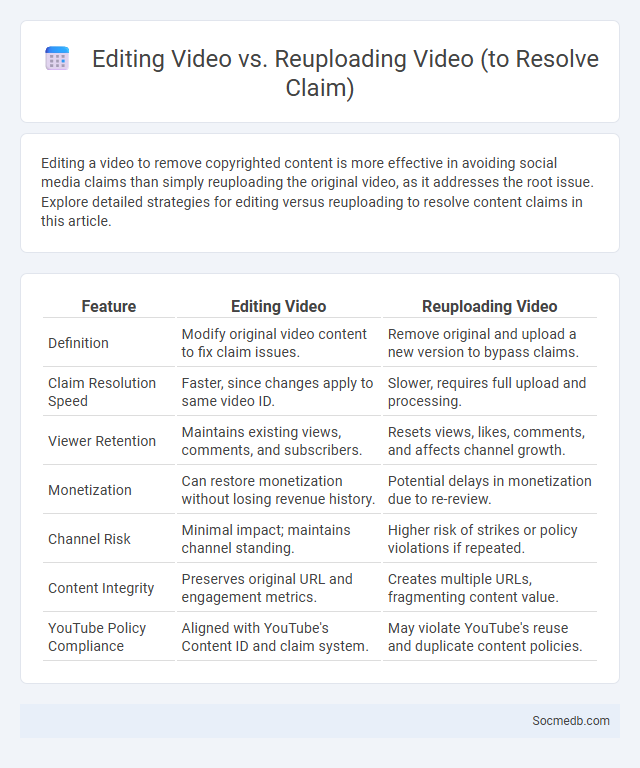
Photo illustration: Editing Video vs Reuploading Video (to resolve claim)
Editing a video to remove copyrighted content is more effective in avoiding social media claims than simply reuploading the original video, as it addresses the root issue. Explore detailed strategies for editing versus reuploading to resolve content claims in this article.
Table of Comparison
| Feature | Editing Video | Reuploading Video |
|---|---|---|
| Definition | Modify original video content to fix claim issues. | Remove original and upload a new version to bypass claims. |
| Claim Resolution Speed | Faster, since changes apply to same video ID. | Slower, requires full upload and processing. |
| Viewer Retention | Maintains existing views, comments, and subscribers. | Resets views, likes, comments, and affects channel growth. |
| Monetization | Can restore monetization without losing revenue history. | Potential delays in monetization due to re-review. |
| Channel Risk | Minimal impact; maintains channel standing. | Higher risk of strikes or policy violations if repeated. |
| Content Integrity | Preserves original URL and engagement metrics. | Creates multiple URLs, fragmenting content value. |
| YouTube Policy Compliance | Aligned with YouTube's Content ID and claim system. | May violate YouTube's reuse and duplicate content policies. |
Understanding Copyright Claims on Video Platforms
Understanding copyright claims on video platforms is essential for creators to protect their content and avoid legal issues. Video-sharing sites like YouTube and Vimeo utilize automated tools such as Content ID to detect copyrighted material, enabling rights holders to claim ownership and monetize or block videos. Creators should familiarize themselves with fair use policies, licensing agreements, and dispute processes to navigate copyright claims effectively and maintain compliance.
What is Video Editing for Copyright Resolution?
Video editing for copyright resolution involves modifying multimedia content to address copyright claims by removing or altering copyrighted materials like audio, video clips, or images. This process helps creators maintain compliance with content platforms' regulations, ensuring their videos remain available and monetizable. By applying precise edits, you protect your social media content from takedowns and legal disputes related to copyright infringement.
Reuploading Videos: Pros and Cons
Reuploading videos on social media platforms can enhance your content reach by tapping into different audience segments and increasing visibility through multiple channels. However, it risks copyright infringement issues and potential penalties from platform algorithms that favor original content. To maximize benefits, ensure proper permissions and customize videos to maintain freshness and engagement.
Editing Video to Resolve Copyright Claims
Editing video to resolve copyright claims often involves removing or replacing copyrighted audio or visual elements that trigger content identification systems. Tools like trimming, blurring, or substituting infringing clips with royalty-free media can help bypass automated claims while preserving your video's core message. By carefully adjusting your content, you protect your channel's reputation and ensure your audience can enjoy your work without interruptions.
Risks of Reuploading Copyrighted Content
Reuploading copyrighted content on social media exposes you to significant legal risks including copyright infringement claims and potential account suspension. Social media platforms use advanced content identification systems that detect unauthorized reposts, leading to content removal and penalties. Protect your online presence by sharing original content or obtaining explicit permission from copyright holders before reposting.
Platform Policies: Editing vs Reuploading
Platform policies on social media vary significantly when it comes to editing versus reuploading content. Some platforms allow users to edit captions or minor features of posts, while major changes often require reuploading the entire content, which can affect engagement metrics and visibility. Understanding these distinctions helps you maintain compliance and maximize the reach of your posts without risking penalties or content removal.
Impact on Video Performance and Analytics
Social media platforms significantly enhance video performance by increasing reach and engagement through algorithm-driven content distribution and user interaction metrics. Advanced analytics tools provide granular insights into viewer behavior, including watch time, click-through rates, and demographic data, enabling precise optimization of video content. These data-driven strategies empower creators and marketers to refine their campaigns, boosting overall visibility and return on investment.
Legal Implications: Copyright Infringement
Social media platforms frequently face legal challenges related to copyright infringement, where unauthorized sharing or use of protected content can lead to lawsuits and financial penalties. Your responsibility includes understanding intellectual property laws and ensuring that any shared material is either original, licensed, or falls under fair use to avoid infringing on others' copyrights. Content creators and users must implement proper attribution and obtain necessary permissions to maintain compliance with copyright regulations in the digital space.
Best Practices for Avoiding Copyright Claims
To avoid copyright claims on social media, you should always use original content or obtain proper licenses for images, music, and videos. Respect copyrighted material by giving appropriate credit and avoiding unauthorized sharing or modification. Monitoring your content and understanding platform-specific copyright policies can protect your social media presence and ensure you stay compliant.
Choosing the Right Approach: Edit, Reupload, or Dispute?
Choosing the right approach for handling social media content issues depends on your goals and the platform's policies. Editing a post lets you fix errors without losing engagement, while reuploading can help if significant changes are needed but risks losing original likes and comments. Disputing content removal or copyright claims protects your rights but requires understanding the legal framework and your specific case to ensure success.
 socmedb.com
socmedb.com